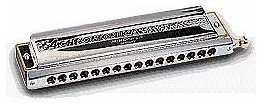
I am a harmonica player of the blues variety. This is a pursuit that requires a modest amount of talent and a significant amount of discipline. Practice is important. Harmonica maintenance is key - these little "toys" are surprisingly complicated and subject to annoying problems. A simple diatonic ten-hole harmonica has a comb (the body of the instrument that contains the holes that the player blows through), two reed plates (10 reeds each for a total of 20 reeds) and two cover plates (the shiny metal exterior that shapes the sound of the harmonica). Every part of this instrument can cause problems, but the most frustrating components are the reeds. They are tiny brass things, and they get stuck a lot (spit can be like glue to a harmonica reed). Harmonica reeds also go out of tune, come loose, break and mysteriously turn into dead metal. Replacing or tuning a reed takes time, effort and the mindset of a jeweler, or a dentist (not to mention a kit of obscure tools). This is why many harp players are members of the "blow 'em and throw 'em" club. When the harmonica drops a reed or goes out of tune, you throw it into the "harmonica junk" pile. Every serious harp player has a bunch of wounded harps in a box or a drawer someplace. I must have 100 of these sad, busted tin sandwiches in my basement. I don't like to think about these instruments and the amount of money I spent on them. Yes, I should dig into the details of harmonica repair, but it is not my desired activity. I am a player, not a harmonica repairman.
I used to front a blues band. I was an amateur, a harmonica blues hobbyist, but my band mates were top-notch Chicago pros. I started the band on Thanksgiving in 2003 and shut it down in early April 2010. During that time, I became pretty comfortable as a band leader. My harmonica chops improved, and I was careful to keep my instruments in good shape. We sounded pretty good after a few years. I haven't played much harmonica since the band shut down.
As I was hanging around the Chicago Blues Festival earlier this month, I ran into Harry Garner (aka Harry da Harp), a harmonica buddy of mine who was leading a "harmonica blow-off" on one of the smaller stages at the fest. He convinced me to sit in for a tune.
I was caked in rust.
My chromatic harmonica decided to go wonky on me - several reeds jammed. I felt nervous in front of the large crowd and the adrenaline surge caused me to overplay and over-sing. To be honest, I stunk. I have not been exercising the disciplines of practice and harmonica maintenance. I did the best I could, but it was a sub-standard display.
Now many people wonder why anyone would ever be interested in devoting time and effort to the harmonica. I can't really explain it, except to remember that humans engage in many strange and pointless activities - bowling, karaoke, hoarding, fashion shows, etc.... Honking on a harmonica probably deserves to be included in this group. The only thing worse than engaging in a strange and pointless activity is doing it poorly. Everything worth doing requires attention and practice. Even things that ARE NOT worth doing require attention and practice.
So my self-criticism has begun to motivate me. I am looking up the guy that used to fix my chromatic harmonica. If I am going to play the damned thing, it has to function correctly. I have begun to practice, much to the distress of my little one-eyed dog (he howls and cries in agony as soon as I play a single note).
I may try to make a harmonica comeback.




